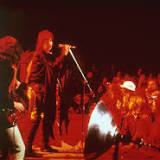US bolsters military presence in Middle East as threat of regional escalation intensifies

 View image in fullscreen
View image in fullscreen
US bolsters military presence in Middle East as threat of regional escalation intensifies
Washington is bracing for Iran and its allies to respond to the killing of Hamas leader Ismail Haniyeh, which Tehran blames on Israel
- See all our Middle East coverage
The US military will deploy additional fighter jets and navy warships to the Middle East, the Pentagon said on Friday, as Washington braces for Iran and its regional allies to make good on a promise to respond to the killing of Hamas leader Ismail Haniyeh in Tehran.
After the back-to-back assassinations of Haniyeh in Tehran on Wednesday and top Hezbollah commander Fuad Shukr in Beirut the evening before, international diplomats have scrambled to head off a full-fledged regional war. Rising tensions have spurred a growing list of major airlines into cancelling flights to Tel Aviv or Beirut, including Lufthansa, Delta and Air India.
On Friday France urged its citizens to leave Iran and Cyprus said it had expanded plans to support a large-scale evacuation from the region if the war expands. The island nation helped tens of thousands of people leave during the 2006 war between Israel and Hezbollah.
The US defence secretary, Lloyd Austin, approved sending the additional Navy cruisers and destroyers – which can shoot down ballistic missiles – to the Middle East and Europe on Friday and the US will also send an additional squadron of fighter jets to the Middle East.
“Austin has ordered adjustments to US military posture designed to improve US force protection, to increase support for the defence of Israel and to ensure the United States is prepared to respond to various contingencies,” the Pentagon said in a statement.
The US military previously intensified deployments prior to 13 April, when Iran launched an attack on Israeli territory with drones and missiles. Israel successfully knocked down almost all of the roughly 300 drones and missiles with the help of the US and other allies.
It is thought that the threat from Hezbollah in Lebanon could present unique challenges to any efforts by the US to intercept drones and missiles given the group’s vast arsenal and immediate proximity to Israel.
On Friday, the Israeli prime minister, Benjamin Netanyahu, said the country was “in a state of very high readiness for any scenario”. The government had given ministers satellite phones in case Iran’s retaliation takes down communications, Israeli media reported.
Israel killed Shukr – Hezbollah’s second-in-command – in Beirut on Tuesday, a move it said was a response to deadly rocket fire last week on the annexed Golan Heights. Hours later, Haniyeh was killed in Tehran. Haniyeh’s death has not been officially claimed by Israel but it has been widely celebrated inside the country, including by top politicians and former security chiefs.
Iran and Hamas have both accused Israel of carrying out the killing and have pledged to retaliate. On Friday crowds gathered in Qatar’s capital, Doha, to bury Haniyeh, a day after a prayer ceremony in Tehran for the Hamas leader, who was the group’s chief negotiator in efforts to broker a ceasefire in Gaza.
The US president, Joe Biden, who has pushed hard for a ceasefire in recent months, said the killing was “not helpful”, in comments to journalists at a US airbase late on Thursday.
Biden added that he had a “very direct” conversation with Netanyahu about the need to reach a deal. “We have the basis for a ceasefire. He should move on it and they should move on it now.”
On Friday, Pentagon spokesperson Sabrina Singh said the US did not believe escalation was inevitable.
“I think we are being very direct in our messaging that certainly we don’t want to see heightened tensions and we do believe there is an offramp here, and that is that ceasefire deal,” Singh said.
An Israeli delegation will travel to Cairo in coming days for negotiations to reach a Gaza ceasefire and hostage release deal, Netanyahu’s office said on Friday.
Senior Hamas official Sami Abu Zuhri commented on the announcement, telling Reuters: “Netanyahu does not want to stop the war and is using these empty statements to cover up his crimes and evade their consequences.”
Reuters, Agence France-Presse and the Associated Press contributed to this report
- Middle East and north Africa
- US foreign policy
- Israel
- Iran
- Hamas
- Lloyd Austin
- Israel-Gaza war
- news


 Canada
Canada Argentina
Argentina  Australia
Australia  Austria
Austria  Brazil
Brazil  Germany
Germany  Ireland
Ireland  Italy
Italy  Malaysia
Malaysia  Mexico
Mexico  New Zealand
New Zealand  Poland
Poland  South Africa
South Africa  United Kingdom
United Kingdom  United States
United States 
























